北京烤鸭在纽约火了!600多元一只烤鸭,预定排到明年二月!
12月11日,北京大董烤鸭的首家海外分店在纽约曼哈顿开张迎客。
脆皮、甜面酱、葱丝、黄瓜……西餐Style的烤鸭,诱人中透着一点高冷……
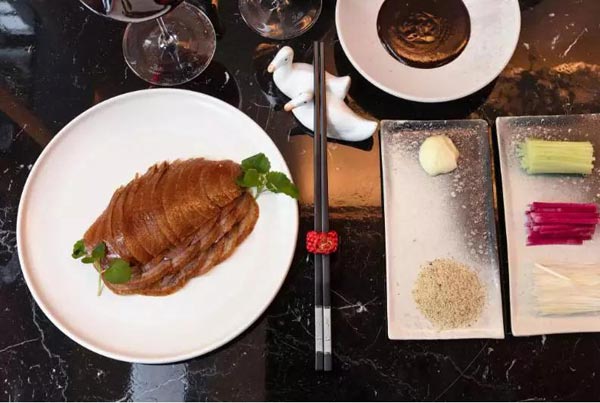
这家餐厅的装饰结合了西餐厅的模式,但是也保留了传统的中式风格……
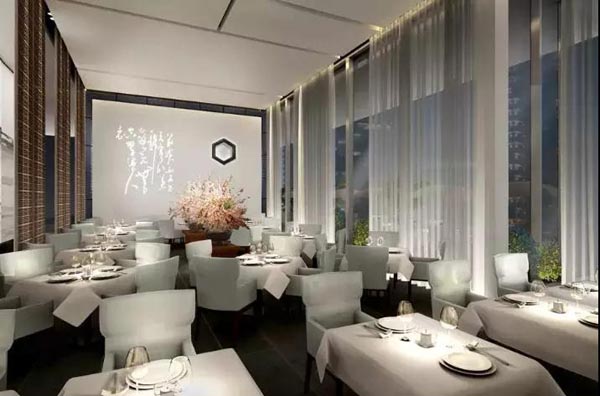
The Manhattan branch has 440 seats, including about 200 on outdoor terraces, sprawled over 17,500 square feet on the building's second and third floors.
曼哈顿分店有440个座位,其中包括200个室外露台座位,二三层占地1.75万平方英尺(约合1625.8平方米)。
和国内不少烤鸭店一样,店里还是可以看到片烤鸭的师傅……
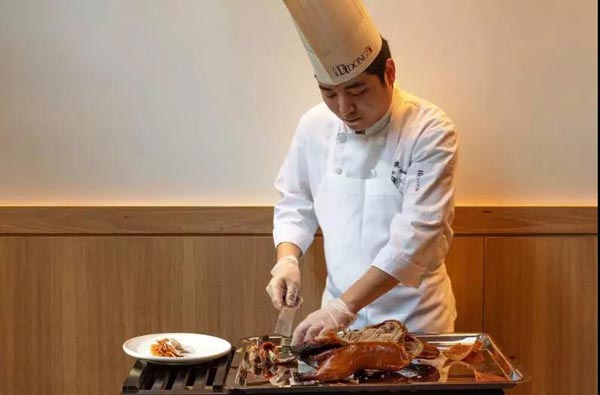
看餐厅颇为不错的样子,但做什么菜才是关键!我们来看看大董纽约店的菜单。
菜品总共有80多样,其中招牌菜烤鸭,一套“酥不腻”烤鸭98美元(约合人民币648元),半只烤鸭58美元(约合人民币383元),还可以搭配黑鱼子!
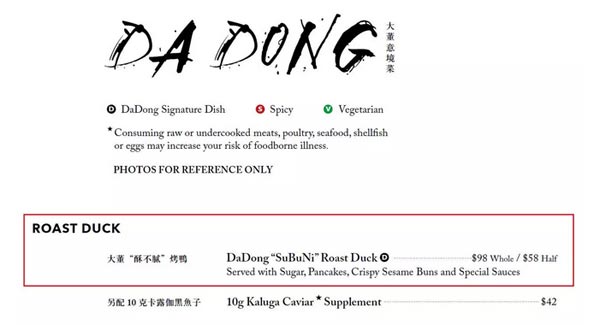
大董“酥不腻”烤鸭
DaDong "SuBuNi" Roast Duck
——$98 Whole/ $58 Half
Served with Sugar, Pancakes, Crispy Sesame Buns and Special Sauces
价格不菲,但并没有阻挡纽约人民的热情。
据《纽约时报》11月28日报道,预定刚开启了2个小时,就已经排到明年二月份了……
A few weeks ago, within the first two hours of becoming available, 2,500 reservations were booked through February, overloading the phone lines.
几个星期之前,预定开始的两个小时,餐厅就收到2500张订单,定位排到了明年2月,订餐电话都挤爆了。
这么受欢迎,可能是因为真的很好吃。据彭博生活追求栏目(Bloomberg Pursuits)介绍,大董烤鸭香酥可口、滑而不腻。
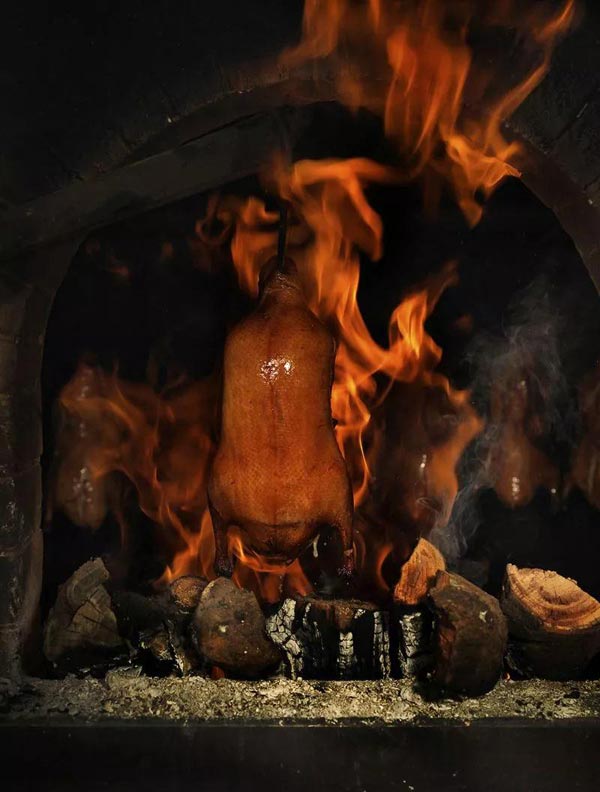
DaDong's version of the dish — a combination of lacquered skin and succulent meat, usually wrapped in a pancake with scallions and hoisin sauce — is magnificently crispy but meatier than much of the competition.
大董烤鸭表皮光滑油亮、肉质鲜嫩多汁,配以葱丝和烤鸭酱裹在春饼里,口感十分酥脆,比其他品牌的烤鸭更有肉质感。
scallions ['skæljən]:葱
hoisin:用大豆、糖、醋和大蒜制成的棕红色甜辣酱
该报道还介绍了具体吃法,一份烤鸭可以有四种搭配吃法。(咽口水jpg.)
Traditional-style comes with pancake, hoisin, and three to four pieces of duck meat (and skin), as well as watermelon radishes, cucumber, and scallion slices.
传统吃法是卷饼内涂甜面酱,包上3-4片鸭肉片(或鸭皮),并搭配水萝卜条、黄瓜和细葱丝。
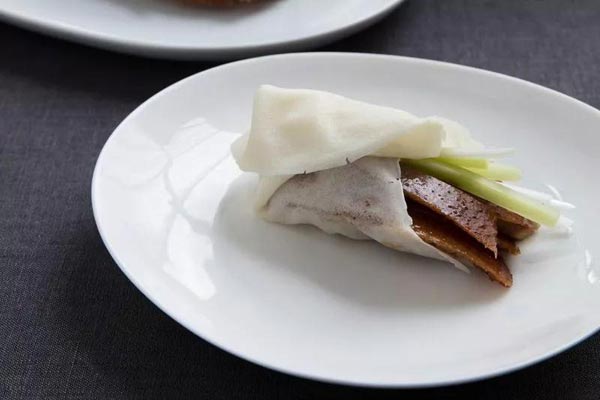
There's also a sesame-puff bun, a flaky pastry shell that's meant to be stuffed with the duck meat, a pungent garlic paste, and vegetable garnishes.
还有一种吃法是用空心芝麻包,把鸭肉塞进这种薄皮面点壳内,并塞入大蒜辣酱和蔬菜配料。
flaky:薄片的
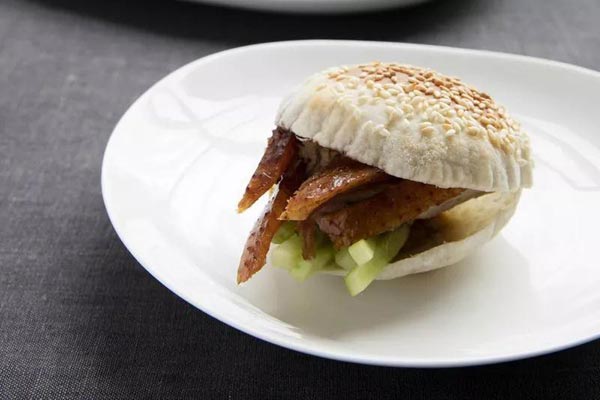
A further option is to dip the duck in a bowl of sugar and eat it plain.
还有一种方法是可以把直接用烤鸭蘸糖吃。
Finally, there's the Kaluga caviar accompaniment, which costs an additional $42 and is meant to be spooned between the skin and the meat.
最后也可以配卡露伽黑鱼子,这份佐料需另花42美元(约合人民币278元),可用勺子均匀涂在鸭肉和鸭皮之间。
caviar:鱼子酱
其实,在大董烤鸭打入纽约之前,北京烤鸭早已享誉海外。
作为最有名的北京菜,烤鸭以色泽红艳、肉质细嫩、味道醇厚、肥而不腻的特色引诱着国内外无数吃货。
外国人对烤鸭的爱从他们的文字描述中就能感受到:
Imagine the best Peking Duck you’ve ever had. That crispy, amber-toned skin. That juicy, melt-in-your-mouth breast meat. Those deeply nuanced, deeply aromatic flavors, expertly engineered to send your pleasure sensors spinning.
想象一下你吃过的最美味的北京烤鸭。那酥脆的、泛着琥珀色油光的鸭皮;那多汁的、入口即化的鸭胸肉;那细腻醇厚、回味无穷的肉香,一切都恰到好处,让你的味蕾爆发。
《孤独星球》(Lonely Planet)还介绍过烤鸭的前世今生:
Peking duck was first mentioned in royal cookbooks during the Yuan dynasty (13th century), but didn’t come to the fore until the early 1900s, when former imperial cooks began opening roast duck restaurants outside the palace walls.
北京烤鸭这道菜早在元朝(13世纪)就已经出现在宫廷食谱中,但直到20世纪初期,出了宫的御厨把烤鸭店开到了皇墙外边,北京烤鸭才变得广为人知起来。
也讲解了烤鸭的制作过程:
To prepare the duck, chefs first inflate the bird by blowing air between the skin and body. They then prick the skin and pour boiling water over the duck. Some chefs add malt sugar to the skin so that it glows golden brown once roasted.
做这道菜之前,厨师要先往鸭子皮下与身体之间充气。之后把皮刺破,开水烫皮。有的厨师会往鸭子身上浇糖水,这样烤熟之后整个烤鸭都呈现出枣红色泽。
一些文章甚至还研究过烤鸭的各种派系:
Closed oven style 焖炉烤鸭
Peking Duck is originally roasted in a closed oven, and Bianyifang is the restaurant who keeps this tradition. The closed oven is built of brick and is preheated by burning Gaoliang sorghum straw at the base. The duck is placed in the oven immediately after the fire burns out, allowing the meat to be slowly cooked through the convection of heat within the oven. Controlling the fuel and the temperature is the main skill.
烤鸭最早是焖炉烤制的,便宜坊一直保持这一传统。焖炉用砖砌成,先用秫秸烧热,待无明火之后,立刻将鸭子挂进炉内,由炉内热气焖烤而成。掌炉人必须掌好炉内的炭火和温度。
In closed oven style, duck meat is combined well with the fat under the skin, and therefore is juicy and tender.
这种方法烤出来的鸭肉与皮下肥油完美融合,肉质细嫩鲜美。
Open oven style 挂炉烤鸭
The open oven was developed in the imperial kitchens during the Qing Dynasty, and adopted by the Quanjude restaurant chain. It is designed to roast up to 20 ducks at the same time with an open fire fueled by hardwood from peach or pear trees.
挂炉烤鸭发明于清朝御膳房,全聚德是这一派系的传承人。这种炉口无门,可以同时烤20只鸭子,下面用梨、桃木等果木火烤。
The ducks are hung on hooks above the fire and roasted at a temperature of 270 °C for 30–40 minutes. In open oven style, the fat is usually melted during the cooking process, so the skin is crispy, and can be eaten separately as a snack.
鸭子由铁钩挂在炉火上,在270摄氏度的高温下烤30-40分钟。挂炉烤鸭的肥肉在烤制过程中都已融化,因此鸭皮酥脆可口,可单做一道小食食用。
总之,烤鸭做起来非常复杂,绝对不是一道家常菜,但是外国人却写了不少文章,教大家如何自制烤鸭……

美食网站ChefSteps:终极指南!自制酥脆、琥珀光泽的北京烤鸭(预计用时:制作4小时,共需4-6天)

《卫报》:制作一道美味的外酥里嫩、肉香四溢的北京烤鸭快不了,但慢工出细活。你是烤鸭铁杆粉吗,敢不敢来试一试?
但是自己做的烤鸭哪有大北京的地道,于是各国游客来北京必尝烤鸭。
网上有各种热情洋溢的攻略指南帖:

不仅游客为烤鸭疯狂,许多外国政要也都是北京烤鸭的粉丝,比如美国前国务卿基辛格(Henry Kissinger)。
1971年7月,基辛格作为美国总统尼克松的特使来到北京,与周恩来总理举行秘密会谈。周总理请他吃北京烤鸭,一度紧张的会谈气氛在基辛格吃过这道人间美味后立刻缓和。
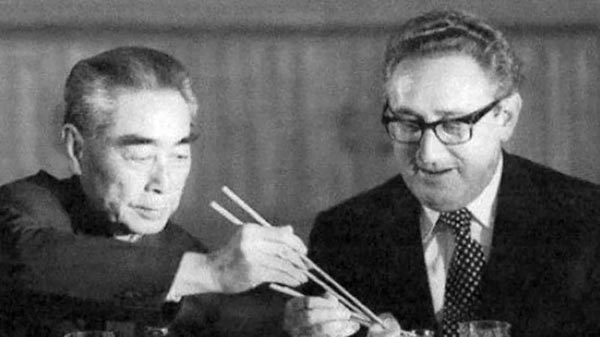
据报道,基辛格曾这样表达他对烤鸭的热爱:
“After a dinner of Peking duck, I'll agree to anything.”
“只要给我来一份北京烤鸭,我愿意签署任何文件。”
当然,北京美食绝不止烤鸭一种,下面是《孤独星球》和一些外媒盘点的北京菜,一起来看看有没有你爱吃的……
炸酱面 Zhajiang noodles
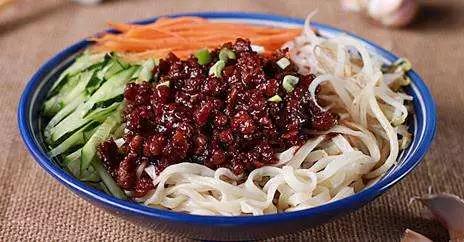
Firm, drained, hand-pulled wheat noodles are topped with minced-pork in a smoky yellow-soybean paste reduction in this classic Beijing noodle dish.
炸酱面这道经典老北京菜是滤过汤的干硬小麦拉面,上面浇上肉沫和黄豆制成的烟熏黄酱。
To balance out the addictive saltiness of the chunky sauce, fresh vegetables are laid to the side - julienned cucumber, crunchy radish and, in modern Beijing, juicy bean sprouts or edamame (fresh soybeans).
为了均衡浓厚酱汁带来的咸味,边上还得配上新鲜蔬菜——切成丝儿的黄瓜,嚼起来嘎吱发脆的萝卜,今天,北京人还会加点儿多汁的豆芽或者毛豆(没有熟透的黄豆)。
chunky:厚实的
julienned:切丝的
radish:萝卜
bean sprout:豆芽
edamame:毛豆
You lovingly turn the toppings through the noodles to reach the flavour-to-noodle ratio of your liking and quietly slurp away.
满心欢喜地搅拌面条,使面条和酱味儿达到你喜欢的混合程度,然后再悄悄地,哧溜哧溜一碗面下了肚。
豆汁儿 Mung-bean milk
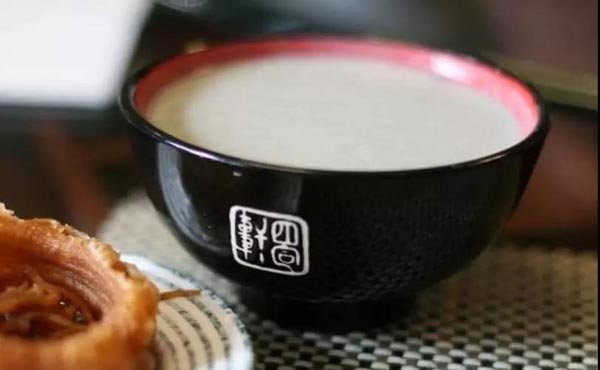
Love or hate it. One of Beijing’s most famous and unique flavours is a grey-green drink that locals have proudly adored since the Liao dynasty (907-1125).
不论你喜不喜欢,这碗灰绿色的豆汁都是北京最为出名和最独特的美食之一。北京本地人都十分自豪,从辽代(907-1125)起这道菜很受喜爱。
Sometimes translated as ‘soymilk’, Beijing’s dòuzhī is actually made from mung beans, has a mild sourness to it and isn’t sweet like soymilk.
有些人翻译为”soymilk“(黄豆豆浆),但实际上北京的豆汁是用绿豆做的,有一丝酸味,不像豆奶那么甜。
You’ll find dòuzhī throughout the city, from street stalls to restaurants, and it warrants a taste to find out if you are a dòuzhī lover or hater.
北京城里,从街边小摊儿到餐厅馆子里,处处都有卖豆汁儿的。如果要知道你是豆汁儿粉还是豆汁儿黑,你就有必要尝一口。
To help mung-bean milk go down, try it with the usual accompaniment of strips of spicy pickles. Beijingers swear by the health benefits of protein- and fiber-rich dòuzhī and claim that it cools you down on a stifling Beijing summer’s day and warms you up in winter.
配着吃的“下豆汁儿菜”一般有辣咸菜条儿。北京人深信豆汁儿富含蛋白和纤维,有益健康,声称豆汁儿能让人在北京的酷暑里感到凉爽,寒冬里感到温暖。
pickles:咸菜
炒肝儿 Stir-fried pork liver
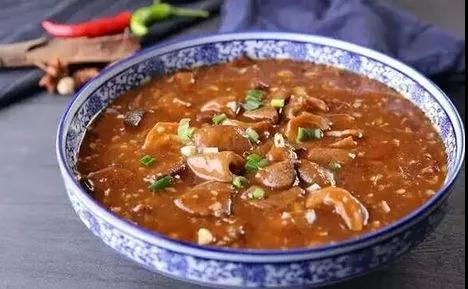
If you like liver, then this sauteed pork-liver in a thick soup will have you licking your lips, literally.
如果你喜欢吃肝子,那么讲真,这碗浓汤中的嫩煎猪肝一定会让你馋得舔嘴巴。
The traditional way to eat chǎo gānr is by sipping its salty mushroom broth directly from the bowl. You may need the spoon for the chewy lungs and intestines.
炒肝的传统吃法是直接啜饮碗里的咸味儿菌菇肉汤。可能你还需要用勺子才能吃到有嚼头的猪杂。
intestines:内脏、下水
This Beijing speciality isn’t subtle – it’s sprinkled with raw garlic and is served for breakfast. Yes, breakfast.
这道北京风味不是那种精致小菜——撒点儿生蒜瓣,就成了一顿早餐。恩没错就是早餐。
爆肚 Quick-fried Tripe
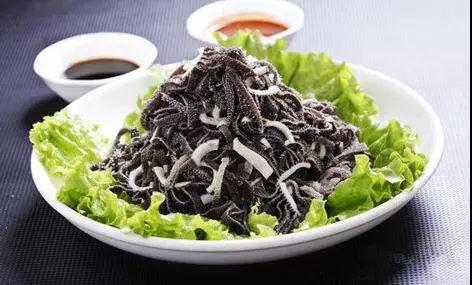
Quick-fried Tripe is one of the best examples of old Beijing local snack. Tripe is from the stomachs of a bull or a lamb. It should be washed very clean, and then cut into stripes and put them into a pot of boiling water to cook thoroughly.
爆肚是最典型的老北京小吃之一。“肚子”是牛胃或者羊胃的一部分。要洗得很干净,然后切成一条一条的,放在滚水锅里煮个透。
By adding cooking oil, sesame sauce, Chinese vinegar, chili oil, bean paste and small pieces of vegetables, the dish is ready to serve.
加入食用油,芝麻酱,醋,泼辣子油,豆瓣酱和几把蔬菜,这道爆肚儿就能出锅了。
焦圈 Fried Rings
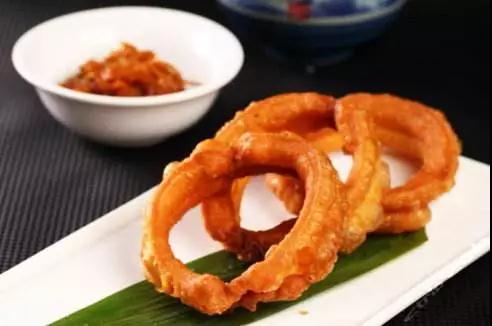
Fried Ring is a household snack in Beijing. It resembles a yellow bangle. Local Beijingers love jiaoquan and usually have it for breakfast with douzhi.
焦圈是一道家常小吃。外表形似金黄镯子,北京当地人一般喜欢就着豆汁当早餐吃。
To make good jiaoquan, one must pay attention to what wheat they use. It is said the Zhangjiakou wheat is the best choice as the wheat is red and can make for the crispy taste. Mixing edible alkali into the wheat is also suggested.
要做出好吃的焦圈,必须要注意选用小麦面粉的过程。据说最好是选张家口小麦,因为张家口小麦色红,而且能做出脆脆的口感。也有人建议往面粉中加入食用碱。
edible alkali:食用碱
豌豆黄 Pea Flour Cake
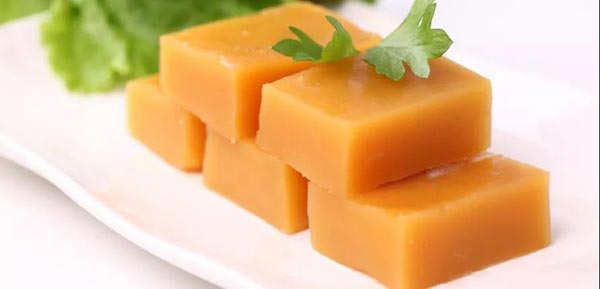
As one part of Beijing culture, pea flour cake is a sort of traditional snack of Beijing, taking in spring under Beijing custom. It is light yellow and tastes sweet and cool, just smelting in your mouth.
作为北京文化的一部分,豌豆黄是一种典型的传统春令小吃。色泽微黄,味道清爽微甜,入口即化,回味无穷。
Its making process is as follows: grind up the pea, take off the skins, clean them up, boil until soft, frozen-up, finally cut into pieces. It is said that pea flour cake is favored by Empress Dowager Cixi, hence even more famous.
作法是碾碎豌豆,去皮,洗清,煮软然后冷冻,最后切成小块。据说,慈禧太后很爱吃这道小吃,所以声名远扬。
下一篇:那么,白条鸭安全吗?
